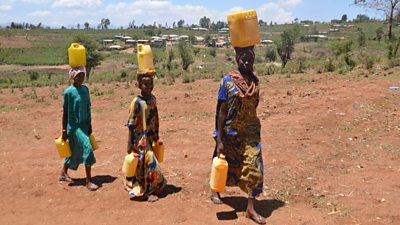Publication: May 2021
Authors: Hilina Assefa; Nicola Bailey; Kaushiki Ghose
With millions of people unemployed (according to the Central Statistical Agency of Ethiopia), it is unsurprising that unemployment and instability are big concerns for young people in the country. And young people face a variety of barriers – including gender and cultural norms – in finding jobs.
With these challenges in mind, in 2021, with funding from the Packard Foundation, 91�ȱ� Media Action collaborated with the Jobs Creation Commission (JCC) to gain a better understanding of young people in the country: their aspirations, and what factors hold them back from succeeding in employment, and living healthy, active lives. Through a range of research methods, we assessed the information needs of young people, as well as the existing networks, influencers and stakeholders which may impact their decisions and roles in their communities. We also explored the role of media and communication in supporting young people to realise their aspirations.
Methodology
We used a mixed-methods research approach to understand the employment needs, challenges and aspirations of young people, the impact of gender norms, and the different challenges faced by rural and urban youth. We surveyed 2,000 young people (aged 15-29) in four regions and in the city administration of Addis Ababa in May 2021. The survey highlighted differences in young Ethiopians’ attitudes towards work and saving, education, traditional norms, youth participation in decision making and in community life. We then used segmentation analysis to split the sample into five groups, each one differing in how far they participate in civic life, their attitudes towards traditional gender and cultural norms, and the barriers that they face around employment and accessing various services.
Key findings
In our survey, unemployment was cited by 59% of young people as the main issue affecting their lives. Young people are often unaware of, or are not accessing, the services which may be available to them; both employers and older community members may have negative perceptions of young people, with women facing more barriers and fewer opportunities.
Research also found:
- In urban areas, graduates struggle to find work in the profession they have trained in, as there are not enough graduate jobs available.
- In rural Ethiopia, families tend to have greater financial constraints and need young family members to contribute by either working for the family business, which they often don’t get paid for, or prioritising work that can financially support their family. A lack of access to social media and the internet mean that it is also difficult to find out about job opportunities.
- In both urban and rural areas, unfair recruitment practices such as nepotism, and discrimination due to age and ethnicity are barriers to getting a job.
- There is a distinctly different social understanding of ‘being young’ for men and women. Girls and young women in Ethiopia are often part of the ‘inner circle’ of their parents’ lives, meaning that compared to boys and young men, they have less or no leisure time and take on adult responsibilities earlier in life. On the other hand, young men in Ethiopia have a ‘public life’ – they leave the house, spend evenings with friends, and are sometimes described by their parents as ‘spoiled’ and out of their control.
- Early marriage is also much more common among women in Ethiopia, which impacts their ability to continue with their education or pursue employment opportunities.
Despite the employment challenges they face, young people in Ethiopia are optimistic about their future, and many are taking steps to achieve their aspirations. They are working to build connections and networks, and gathering resources and skills to start their own businesses.
I believe that the reason for me to be [out of work] is not being well educated. So I am planning to learn my masters. I want to upgrade myself despite the financial difficulties."
Next steps
This research found that media and communication could seek to leverage young Ethiopians’ optimism and enthusiasm, providing informative and inspiring content to fuel their ideas. This insight informed the creation of a social and behaviour change (SBCC) strategy to engage young people in the workforce, developed in partnership with the Ethiopia Jobs Creation Commission (JCC).
The strategy identifies two key priority segments that need significant support - the ‘progressive but held back’ and the ‘unengaged and unambitious.’ Priority audiences across these two segments are younger adolescents (15-18 year olds), and men and women who are less educated and so more likely to marry before the age of 21. Creating an enabling environment to help these groups, while keeping in mind the needs of others, is central to this strategy. This content will address the needs of priority groups by giving information about job opportunities, using role models and real life stories to inspire and address traditional gender norms.
The long-term objective of this initiative is that young people in Ethiopia are reached, empowered and motivated through a communication strategy which encourages youth participation, shares vital information, educates and improves access to available education, employment and sexual and reproductive health initiatives in the country.
To learn more about this research study and the insights revealed, please see the full series of research briefings below.
Series of research briefings
-
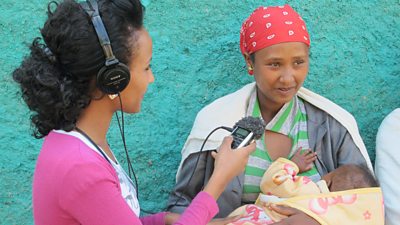 How social and gender norms influence employment and participation for young women in Ethiopia.
How social and gender norms influence employment and participation for young women in Ethiopia. -
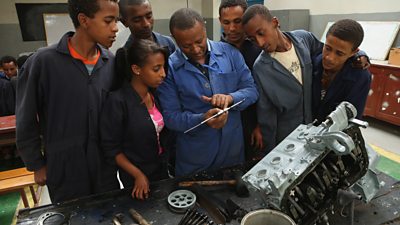 How young Ethiopians are overcoming employment challenges
How young Ethiopians are overcoming employment challenges -
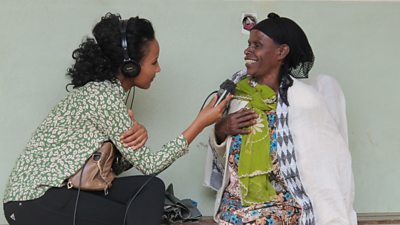 How can the older generation support Ethiopian youth?
How can the older generation support Ethiopian youth? -
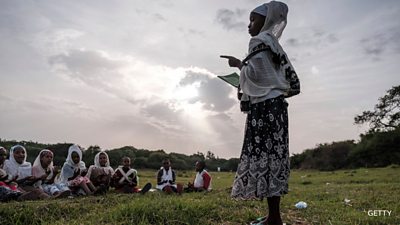 Segmentation analysis was used to split the sample into five groups, reflecting the different profiles of young people in Ethiopia.
Segmentation analysis was used to split the sample into five groups, reflecting the different profiles of young people in Ethiopia. -
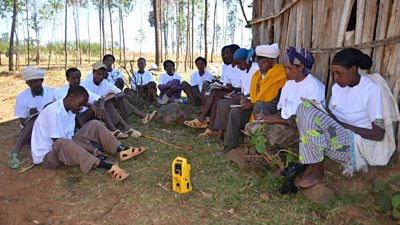 What media is reaching young people across Ethiopia?
What media is reaching young people across Ethiopia? -
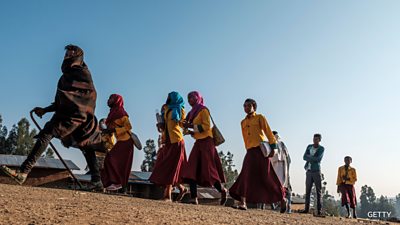 Understanding young Ethiopians’ experiences and views around employment and civic participation
Understanding young Ethiopians’ experiences and views around employment and civic participation -
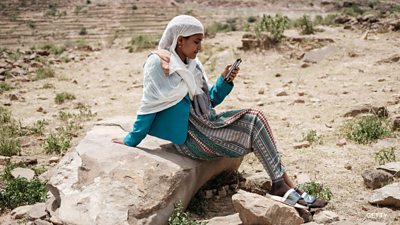 Supporting young Ethiopians to secure and succeed in employment. What role can communication play?
Supporting young Ethiopians to secure and succeed in employment. What role can communication play?
Our research library
-

Long reads
Read our comprehensive research reports of the evidence behind our work. All of our publications are freely available to download. -

Short reads
At a glance, explore key findings and evidence behind our work. All of our publications are freely available to download. -

By country
Explore our findings and analysis country by country. All of our publications are freely available to download. -
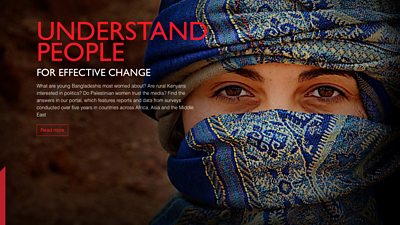 What are young Bangladeshi's most worried about? Are rural Kenyans interested in politics? Do Palestinian women trust the media? Find the answers in our data portal (last updated 2020).
What are young Bangladeshi's most worried about? Are rural Kenyans interested in politics? Do Palestinian women trust the media? Find the answers in our data portal (last updated 2020).
